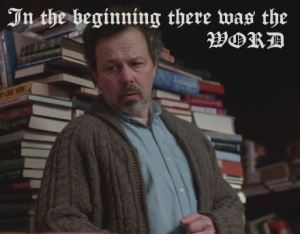In the Beginning Was the Word
 I wrote a couple of years ago about Supernatural’s hubris of effectively literalizing the metaphor of Author as God. In that version, Chuck, author of the supposedly fictional yet altogether too real Supernatural book series, is described as a gospel writer, scripting the Gospel of the Winchesters. As if that weren’t enough, in the season finale, we can only deduce that the writer was in fact not just God’s typewriter but God himself.
I wrote a couple of years ago about Supernatural’s hubris of effectively literalizing the metaphor of Author as God. In that version, Chuck, author of the supposedly fictional yet altogether too real Supernatural book series, is described as a gospel writer, scripting the Gospel of the Winchesters. As if that weren’t enough, in the season finale, we can only deduce that the writer was in fact not just God’s typewriter but God himself.
It seems a familiar narrative: the storyteller as maker of worlds, as God. Narrating has always been a way to create, with naming as a particularly generative power. What I find surprising, then, is not that today’s storytellers engage this trope, but how they have chosen to do so. Rather than merely acknowledging how writers are not only Gods of their own universes as they create fictional worlds, there is a strong sense in some recent instances that argues that writers create reality as well.
In recent weeks there have been two plot lines in completely different shows taking up this narrative, and it makes me wonder about our fascination with the auteur and his authorial “Godlike” control. More, it makes me wonder about the ease in which both writers and academics privilege text over action in ways that make our lives of words as, if not more, important as a life of action. This is not to diminish the importance of critical analysis or the awareness that words matter. It is, however, an attempt to question our eagerness to foreground the mode of engagement we have mastered and with which we are most comfortable.
In the recent Doctor Who episode “The Rings of Akhenaten,” the monstrous antagonist eats people’s experiences and stories of the past. When even the Time Lord’s immense past cannot feed it, his companion Clara instead feeds it the potentiality of future story lines: “It’s full of stories, full of history. And full of a future that never got lived… This leaf isn’t just the past. It’s a whole future that never happened.” What is foregrounded here is the infinite potential of imagination and possibilities. Though, as a fan, I couldn’t quite help wonder if Moffat was celebrating the potentiality of the many worlds spun from the reality of Clara’s mom’s life and, by extension, the show or if we fans were rather the nearly insatiable monster wanting ever more stories. Maybe both?
Likewise, the recent Supernatural episode “The Great Escapist” features the new character Megatron, who is the scribe of God, in charge of the Word. The Archangels, he describes, decided “they take over the universe themselves, but they couldn’t do anything that big without the Word of God.” Megatron went into hiding, instead spending his time reading human stories. And he revels in his description of these stories (both history and literature clearly): “It was something to watch, what you brought to His earth… But really, really it was your storytelling… When you create stories, you become Gods.”
Again, humanity’s largest potential is framed not as our achievements, inventions, and discoveries but as our potential for imagination and storytelling. In fact, even when Dean and Sam berate him for his inaction in the war between demons and angels that has caused so much human suffering, the action yet again is an act of writing: “I am the scribe of God. I erased it,” he responds when asked how he overcame the obstructions the King of Hell had erected.
Words becoming actions – ideas creating reality is a trope nearly as common as the author as God of his fictional universe, but somehow combine these two, and the storyteller, the showrunner, becomes something more than an authorial voice. I am reminded of the Derridean il n’y a pas de hors-texte, which became central evidence in accusations of deconstruction as nihilist. But even in an interpretation where acknowledging that any thing is ultimately a text, can be read and analyzed as text, the political message remains problematic.
For me, personally, it is a matter of necessary versus sufficient propositions: To change the world, it may be necessary to be aware of language and ideology, of the cultural text and those who creates it, but I am very doubtful that it is sufficient. In other words, material alterations always contain textual elements but awareness of and changes in ideology do not guarantee real-life changes. And this is regardless of whether the self-importance comes in the guise of academics or showrunners.


